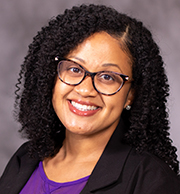
President's Letter: A Challenge on Trauma
By Brittany M. Norman | March 2022
 In 2008, research from The National Child Traumatic Stress Network indicated that one out of four children attending school has been exposed to a traumatic event that can affect learning and/or behavior. Fast forward to today with a society that has been practically functioning in a state of uncertainty and trauma for the past two years. While I do not have the latest research, I am confident the number of children attending school exposed to a traumatic event has doubled since 2008. With schools being a second home for many students, the question becomes: How can we work together to address the issues of trauma and the implications we are experiencing?
In 2008, research from The National Child Traumatic Stress Network indicated that one out of four children attending school has been exposed to a traumatic event that can affect learning and/or behavior. Fast forward to today with a society that has been practically functioning in a state of uncertainty and trauma for the past two years. While I do not have the latest research, I am confident the number of children attending school exposed to a traumatic event has doubled since 2008. With schools being a second home for many students, the question becomes: How can we work together to address the issues of trauma and the implications we are experiencing?According to the Treatment and Services Adaptation Center, the term trauma-informed school refers to an environment where “the adults in the school community are prepared to recognize and respond to who have been impacted by traumatic stress. Those adults include administrators, teachers, staff, and parents.” Sounds good, right? But what does this level of trauma-informed practices really mean and look like?
As school counselors and change agents, we must understand not just the definition of trauma-informed schools but also what this looks like in practice. The Substance Abuse and Mental Health Services Administration (SAMHSA) has established the following guidelines and principles for trauma-informed care:
- Safety
- Trustworthiness and transparency
- Peer support and mutual self-help
- Collaboration and mutuality
- Empowerment, voice and choice
- Consideration, recognition and provision for cultural, historical and gender issues
Contact Brittany Norman, NCSCA president, at president@ncschoolcounselor.org.